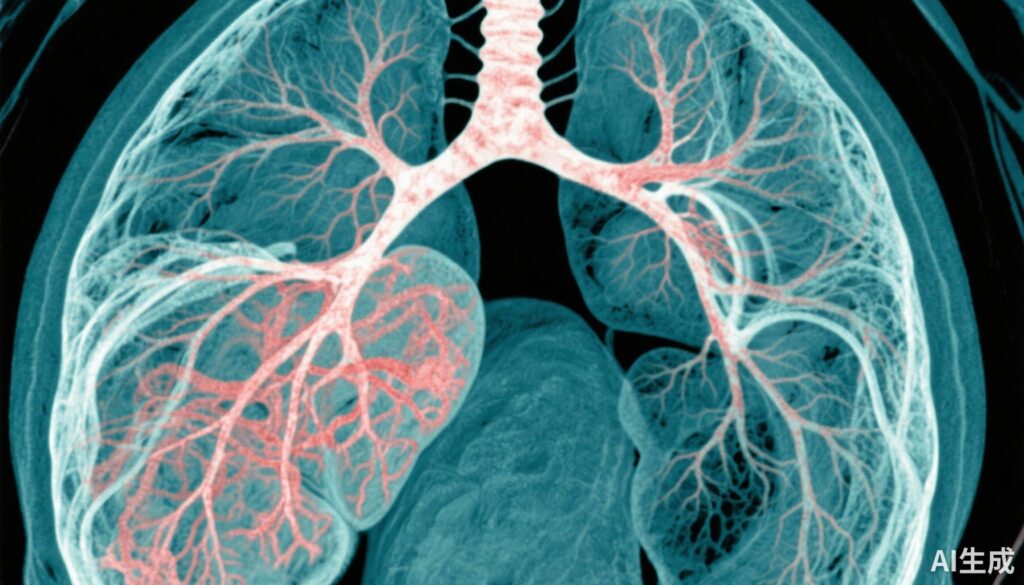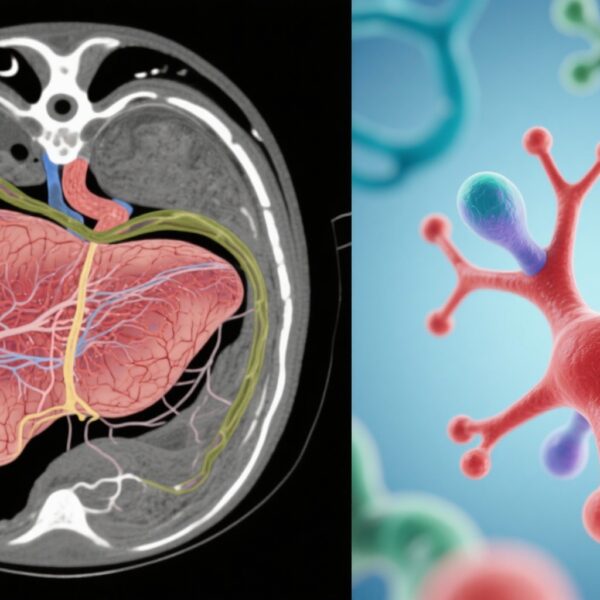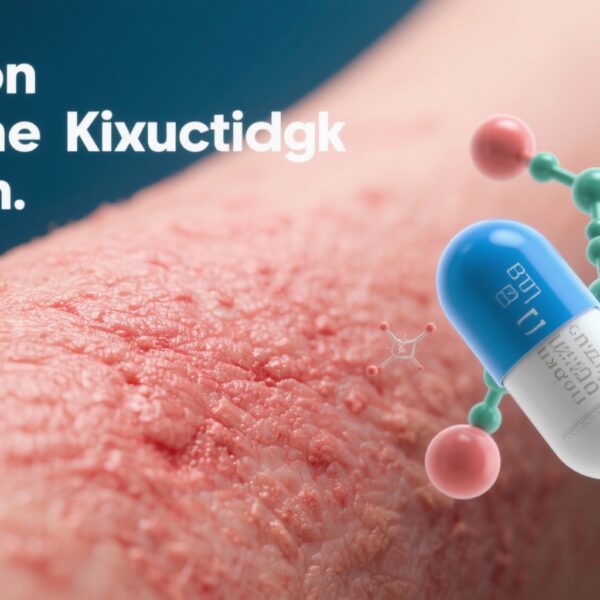Highlight
This phase 2, double-blind, placebo-controlled trial evaluated the effects of bexotegrast, an oral dual inhibitor of αvβ6 and αvβ1 integrins, on type I collagen deposition in patients with idiopathic pulmonary fibrosis (IPF). Utilizing 68Ga-CBP8 PET imaging, the study demonstrated a reduction in active collagen accumulation with bexotegrast compared to placebo over 12 weeks. Additional assessments suggested improved lung microvascular function and favorable changes in pulmonary function and symptomatology.
Study Background
Idiopathic pulmonary fibrosis (IPF) is a progressive fibrosing interstitial lung disease characterized by aberrant wound healing and excessive deposition of extracellular matrix components, predominantly type I collagen, leading to irreversible scarring and loss of lung function. Despite therapeutic advances, IPF remains a disease with poor prognosis and limited treatment options. Current antifibrotic agents slow disease progression but do not reverse fibrosis. αvβ6 and αvβ1 integrins are key mediators of transforming growth factor-β (TGF-β) activation, a central fibrogenic pathway that promotes collagen synthesis. Targeting these integrins represents a potential mechanism to attenuate fibrosis by inhibiting fibrogenic signaling and extracellular matrix accumulation.
Study Design
This was a phase 2, single-center, double-blind, randomized, placebo-controlled clinical trial (NCT05621252) conducted in adults diagnosed with IPF. Ten participants were enrolled, with seven randomized to receive bexotegrast 160 mg orally once daily and three receiving placebo for 12 weeks. The primary endpoint was the change from baseline in whole-lung standardized uptake value (SUV) of 68Ga-CBP8 positron emission tomography (PET), a novel imaging tracer selective for active type I collagen deposition. Secondary endpoints included dynamic contrast-enhanced magnetic resonance imaging (DCE-MRI) parameters assessing lung microvasculature and extravascular extracellular volume, forced vital capacity (FVC), cough severity scores, and circulating biomarkers reflective of collagen synthesis and disease progression. The study was double-blinded to minimize bias, and the intervention period was set at 12 weeks to assess short-term pharmacodynamic effects on collagen dynamics and lung function.
Key Findings
At 12 weeks, participants treated with bexotegrast demonstrated a mean reduction of 1.2% in the top quartile of whole-lung 68Ga-CBP8 SUV compared to a 6.6% increase in the placebo group, indicating decreased active collagen deposition with treatment. Subpleural regions, often the site of predominant fibrotic involvement, showed the most pronounced difference: a mean decrease of 3.7% in the bexotegrast group versus a 10.3% increase with placebo. These findings suggest that dual αvβ6 and αvβ1 inhibition effectively dampens fibrotic activity at the tissue level.
Dynamic contrast-enhanced MRI results supported these PET findings, revealing numerically increased peak enhancement and faster contrast washout rates in participants treated with bexotegrast. These imaging changes imply improved microvascular perfusion and reduced extravascular extracellular volume, consistent with decreased fibrosis and extracellular matrix remodeling.
Secondary clinical measures exhibited trends favoring bexotegrast: modest improvements in FVC, which reflect lung volume capacity; reductions in cough severity, a symptom impacting quality of life; and favorable biomarker profiles related to collagen turnover and disease activity. Although the small sample size limited statistical power, these signals are encouraging regarding clinical benefit.
Regarding safety, bexotegrast was well tolerated with no serious adverse events reported. No significant safety concerns emerged over the 12-week treatment period.
Expert Commentary
Targeting integrins such as αvβ6 and αvβ1 addresses critical upstream activators of TGF-β, a central driver of fibrosis. This trial leverages a novel PET imaging biomarker, 68Ga-CBP8, to noninvasively quantify active collagen synthesis in vivo, offering a powerful translational tool to directly measure pharmacodynamic effects on fibrogenesis. The demonstrated reduction in collagen deposition and improved microvascular parameters provide mechanistic insight into bexotegrast’s antifibrotic action and potential to alter disease trajectory.
While the study’s limited cohort size and short duration constrain generalizability and definitive efficacy conclusions, the well-designed proof-of-concept approach lays important groundwork for larger, longer trials. Additionally, the findings endorse the utility of molecular imaging biomarkers in IPF drug development to more sensitively detect treatment effects beyond traditional pulmonary function testing.
Future investigations should explore longer treatment durations, dose optimization, and integration with other antifibrotic regimens. Given IPF’s heterogeneity, defining responder profiles and assessing impact on hard clinical endpoints such as exacerbations, hospitalization, and mortality will be essential.
Conclusion
This phase 2 trial provides compelling initial evidence that dual inhibition of αvβ6 and αvβ1 integrins with bexotegrast reduces active type I collagen deposition in the lungs of patients with IPF, indicating an antifibrotic effect and potential for favorable lung remodeling. Complementary imaging and functional assessments suggest improvements in lung microvascular integrity and symptomatology. These findings support further clinical development of this novel therapeutic strategy to address unmet needs in IPF treatment.
Funding and ClinicalTrials.gov
This study was registered under ClinicalTrials.gov identifier NCT05621252. Details about study funding were not explicitly provided in the source publication.
References
Montesi SB, Cosgrove GP, Turner SM, Zhou IY, Efthimiou N, Susnjar A, Catana C, Fromson C, Clark A, Decaris M, Barnes CN, Lefebvre ÉA, Caravan P. Dual αvβ6 and αvβ1 Inhibition over 12 Weeks Reduces Active Type I Collagen Deposition in Individuals with Idiopathic Pulmonary Fibrosis: A Phase 2, Double-Blind, Placebo-controlled Clinical Trial. Am J Respir Crit Care Med. 2025 Jul;211(7):1229-1240. doi: 10.1164/rccm.202410-1934OC. PMID: 40153543; PMCID: PMC12264702.



